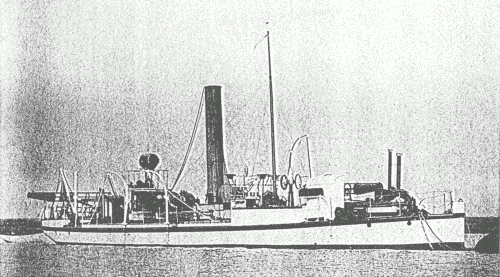
| Name | No | Yard No | Builder | Laid down | Launched | Comp | Fate |
| Vesuvius | Pembroke DYd | 16.3.1873 | 24.3.1874 | 11.9.1874 // --- | served as tender |
|
Displacement normal, t |
245 |
|
Displacement full, t |
|
|
Length, m |
27.4 pp |
|
Breadth, m |
6.71 |
|
Draught, m |
2.59 aft |
|
No of shafts |
2 |
|
Machinery |
2 2-cyl compound, boilers |
|
Power, h. p. |
382 |
|
Max speed, kts |
9.7 |
|
Fuel, t |
coal 25 |
| Endurance, nm(kts) | |
|
Armament |
1 - 406 TT (submerged, bow) |
|
Complement |
15 |
Project history: Commenced soon after ihe Royal Navy adopted the Whitehead torpedo, Vesuvius has a better claim to the title of that services' first torpedo boat than the celebrated Lightning. She had a fairly deep hull, a very low freeboard, and engines as near to noiseless as could be made. To make her as inconspicuous as possible she was built without a funnel, smoke being released through vents along her sides, and she burnt coke so not much smoke was produced in the first place. She carried a battery of reload torpedoes in the compartment from which her submerged bow tube was operated. With her low silhouette, and quiet engines she would have stood a fair chance of making successful surprise night attacks on enemy harbours, but contemporary opinion was obsessed by speed and she was overshadowed by the somewhat impractical early torpedo boats.
Modernizations: None.
Naval service: She was soon after completion relegated to experimental and instructional work for the naval torpedo school, HMS Vernon. When she was fitting out at Portsmouth after being towed from Pembroke she was given a tall funnel, to make it easier to raise steam, and never seems to have used her smoke ducts.

Vesuvius 1890s
© Navypedia, 2020